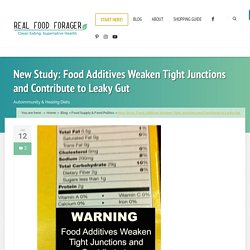

Decreased melatonin secretion is associated with increased intestinal permeability and marker of endotoxemia in alcoholics. - PubMed - NCBI.
SIBO (Small Intestine Bowel Overgrowth), SIFO and Dysbiosis. Fasano – short video on Zonulin, gut permeability and chronic disease – Rosemary Cottage Clinic Blog. Why Grains Are Bad–Part 1, Lectins and the Gut. High–Saturated Fat Diet Increases Endotoxemia. Reference Lopez-Moreno J, Garcia-Carpintero S, Jimenez-Lucina R, et al. Effect of dietary lipids on endotoxemia influences postprandial inflammatory response. J Agric Food Chem. 2017;65(35):7756-7763. Objective To determine whether long-term consumption of diets differing in the quantity and quality of fat influences postprandial intestinal endotoxin absorption. Design Randomized dietary intervention trial Participants This study was performed within the LIPGENE study funded by the European Union. Intervention Participants were randomized to receive 1 of 4 isoenergetic diets for 12 weeks. After 12 weeks on the assigned diet the participants received a fat challenge in which they received 0.7 g/kg body weight of the same fat composition consumed during the dietary intervention phase.
Primary Outcome Measures The researchers tracked plasma lipoproteins, glucose, and gene expression in peripheral blood mononuclear cells (PBMCs) and adipose tissue. Key Findings Practice Implications. How Do Grains, Legumes and Dairy Cause a Leaky Gut? Part 2: Saponins and Protease Inhibitors. How Gluten (and other Prolamins) Damage the Gut. Which comes first: the leaky gut or the dysfunctional immune system? - The Paleo Mom. I was asked by healthline.com to comment on a new study from researchers at Lund University in Sweden that was published earlier this month in the journal PLoS ONE.

The study is entitled “Intestinal Barrier Dysfunction Develops at the Onset of Experimental Autoimmune Encephalomyelitis, and Can Be Induced by Adoptive Transfer of Auto-Reactive T Cells“. Yep, that’s a mouthful, but hang in there. This study is absolutely fascinating and is very relevant to everyone battling autoimmune disease. It’s so interesting that I’m devoting an entire blog post to it!
The study was performed in a well-established mouse model of multiple sclerosis. The purpose of the study was to investigate whether or not increased intestinal permeability, or what we more colloquially refer to as a “leaky gut”, is present in EAE (the experimental model of multiple sclerosis) and, if it is, to understand when it develops and what’s causing it.
But, first, let’s take a step backward. A common Food Ingredient Triggers Autoimmune - Amy Burkhart M.D., R.D. It is not disclosed on labels, but may trigger a leaky gut.

A new research paper has raised concern regarding a commonly used food ingredient that may trigger celiac disease in genetically susceptible people. Equally as alarming is the fact that the ingredient does not have to be identified on food labels The ingredient is called microbial transglutaminase and is actually classified as a “processing aid” and not an “additive”. Because of this, it escapes labeling laws. Microbial transglutaminase (MTG) is widely used in food products including dairy products, meats, baked goods, desserts and low-calorie foods.
MTG and Gluten MTG is attracted to and binds gluten in food. How do you know if you are susceptible to celiac disease if you haven’t had a genetic test? Cause for concern Celiac disease is on the rise. Circadian Rhythm and Increased Intestinal Permeability. 20 Causes of Leaky Gut Syndrome and 15 Natural Treatments to Heal It (+Symptoms) ‘Leaky gut’ is gaining more attention by the day.

This is because various diseases are increasingly associated with the state of our gut. Increased intestinal permeability, also known as ‘leaky gut’, can trigger autoimmune diseases, chronic fatigue syndrome, allergies and even depression. In this post, you will learn more about the intestinal barrier, factors that disrupt it, and ways in which you can heal a leaky gut. Source: The main function of the gut is to absorb nutrients from the food. This barrier basically separates the gut content from the body. These cells are linked by tight junction (TJ) proteins [R]. The intestinal/gut barrier covers a surface of about 400 m2. Endomicroscopy Offers Insight on Leaky Gut Syndrome. New Study: Food Additives Weaken Tight Junctions and Contribute to Leaky Gut.
Researchers have established the connection between the consumption of processed food and autoimmune disease.

In a study published in the journal Autoimmunity Reviews, researchers have identified more processed foods associated with autoimmune disease. Since Dr. Fasano identified the three factors needed in the perfect storm of autoimmunity, leaky gut has become a household word. Fasano described the three factors as: Increased intestinal permeability (leaky gut)A genetic predisposition to autoimmunityAn exposure to an environmental trigger – this could be the food additives discussed here, as well as gluten, dairy, medications, vaccines, etc.
Leaky Gut Syndrome - Is Gluten at the Root?